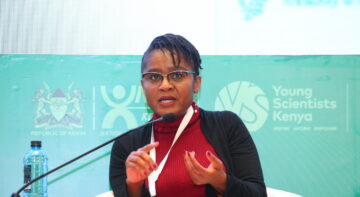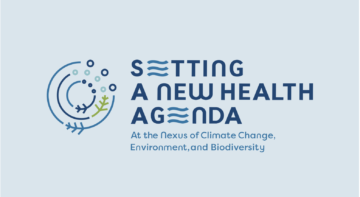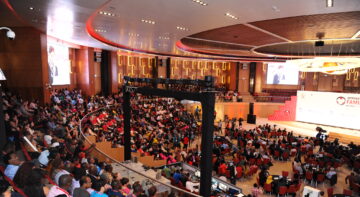News

Friday, 6 November 2020
News release
Nairobi. Scientists from across Africa have committed to play a greater role in championing evidence use in decision making by governments. Evidence from research and data is critical in informing action on sustainable development, but is not always considered as critical in informing policy decisions. Over 400 scientists from East and West Africa resolved to promote use of evidence in decision making at a two-day Evidence Leaders in Africa virtual conference held on 3-4 November 2020.
The conference, with the theme, ‘Strengthening the think-tank role of researchers in supporting government decision-making for better development outcomes’ was convened by the African Academy of Sciences (AAS) and the African Institute for Development Policy (AFIDEP). The conference brought together researchers mainly within the AAS networks, policymakers and practitioners in Africa to share lessons and experiences on researchers’ roles in strengthening evidence use in government decision-making.
At the conference opening, AFIDEP’s Executive Director, Dr. Eliya Zulu said that researchers need to champion use of evidence by producing demand driven research. “It is critical to pay attention to the needs of decision-makers and produce evidence that meets their policy needs. This is the only way the research that we do can impact communities and transform lives.”
Dr. Tom Kariuki, Director of Programmes for the Alliance for Accelerating Excellence in Science in Africa (AESA) platform at the AAS noted that COVID-19 has placed evidence at the centre of government decision making. “Through AESA programmes, we are funding scientists who are generating evidence that is crucial to ensure the success of ELA and in strengthening linkages between science and policy to promote evidence-based policymaking.”
The conference is a culmination of a two-year project dubbed Evidence Leaders in Africa (ELA). Since inception in 2018, ELA has been using various approaches to expand leadership for use of evidence in policy formulation and implementation by African governments. Activities have included sensitising scholars on their role in promoting evidence informed decision making (EIDM) in government; training and mentorship sessions to build the capacity of researchers on EIDM; competitive awarding of seed grants to AAS scientists with innovative approaches to promote EIDM in governments; and the introduction of an EIDM leadership award.
Evidence Leadership Award
AFIDEP recognized and awarded three AAS scholars who have demonstrated innovation with initiatives and interventions that promote EIDM in government institutions in their countries. The award which was a symbolic cash award of US$ 5,000 for the winner and US$ 2,500 for the two runners up was awarded to Prof. Madiagne Diallo as the overall winner and to Prof. Friday Okonofua Ebhodaghe and Dr. Eucharia Oluchi Nwaichi who were the runners up.
Prof. Madiagne Diallo (Senegal) was awarded for his efforts within and outside government structures to support the use of evidence in decision-making. His work has focused on the promotion of frameworks for exchanges between public decision-makers and other stakeholders including scientists, knowledge societies, and civil society to discuss the contribution of evidence in the development of African countries.
Prof. Friday Okonofua (Nigeria) was recognized for his work on policy engagement and use of evidence to advocate for policy and practice in women’s health/sexual and reproductive health issues. One of his notable achievements was the establishment of the Women’s Health and Action Research Centre (WHARC), which has played a key brokering role in supporting evidence use.
Lastly, Nigeria’s Dr. Eucharia Oluchi Nwaichi’s interventions have focused on increasing the space for women in science as well as actively promoting evidence use in the government of Nigeria. One of her initiatives is tailored to developing guidelines for evidence use in Nigeria Natural Medicine Development Agency (NNMDA). This initiative has fostered dialogues with policymakers and researchers.
At the conference closing, Dr Rose Oronje, Director of Public Policy and Communications at AFIDEP urged researchers to prioritise learning from the EIDM efforts by tracking to document and share the lessons, “not just the outputs, but the outcomes too, and where possible, the impact.” Expressing enthusiasm in the growth of the EIDM landscape, Director Strategy and Partnerships, African Academy of Sciences, Dr. Isayvani Naicker says, “Africa can become a leader in evidence. However, there is need for a lot more investment particularly in EIDM and in research.”
The two-day virtual conference featured close to 20 sessions comprising plenary sessions, panel discussions, break-out and side sessions, with rich discussions and sharing on guidelines for evidence use within government agencies; research/knowledge translation i.e. synthesis, packaging, including the use of policy briefs and other non-scientific evidence products; use of platforms for improving interaction and research translation to facilitate interaction between policymakers and researchers; experiences and lessons from Africa on evidence use in times of COVID-19.
– – – – – – – – – – – –
ends
About the African Institute for Policy Development
The African Institute for Development Policy (AFIDEP) is an African-led, non-profit research and policy institute established in 2010 to help bridge the gaps between research, policy, and practice in development efforts in Africa. We contribute to the realisation of the SDGs by enabling the formulation of sound development policies and programme interventions. We work to promote and entrench a culture of evidence use in development efforts in Africa. Specifically, we: strengthen institutional and individual capacity for demand and use of evidence, as well as promoting interactions between researchers and policymakers.
Learn more at www.afidep.org
About the African Academy of Sciences
The African Academy of Sciences (the AAS) is a non-aligned, non-political, not-for-profit pan African organisation. The AAS’s vision is to see transformed lives on the African continent through science. Our tripartite mandate is recognising excellence through the AAS’ highly prestigious fellowship and award schemes, providing advisory and think tank functions for shaping Africa’s Science, Technology and Innovation (STI) strategies and policies and implementing key STI programmes addressing Africa’s developmental challenges.
Learn more at www.aasciences.africa
Media contacts
The African Institute for Policy Development
Ann Waithaka | ann.waithaka@afidep.org | +254 727268352
The African Academy of Sciences
Charles Njagi | c.njagi@aasciences.ac.ke | +254 20 806 0674
Related Posts





